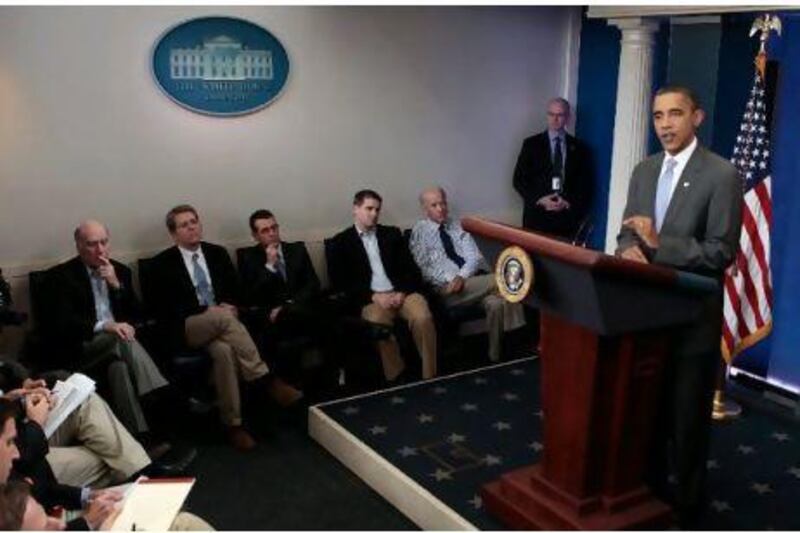WASHINGTON // The White House said an agreement struck over the weekend with congressional leaders to avoid a US debt default represented a "victory" for bipartisan compromise.
The deal, the White House said in a statement, "removes the cloud of uncertainty over our economy" and stays true to a commitment by Barack Obama, the US president, to "shared sacrifice" by shielding the middle class and the poor from the burden of deficit reduction.
The framework deal would see the debt ceiling raised over three instalments beginning immediately and accompanied by more than US$900 billion (Dh3.3 trillion) in spending cuts. Later in the year, this would be followed by a further $1.2 trillion to $1.5 trillion debt ceiling increase pending agreement on similar amounts in deficit reduction measures.
Concerns over how the US economy so easily was held hostage by narrow political interests, especially on the far right of the Republican Party, are likely to have continuing consequences.
Christine Lagarde, the head of the International Monetary Fund, recently warned that the debt debacle was "probably chipping away" at what she said was traditionally a "positive bias" towards US Treasury bills. Credit agencies continued to warn yesterday that the deal, which is essentially short term and does not address some of the fundamental structural problems in the US economy - might still not be enough to avoid a downgrade of America's AAA credit rating. Some analysts said they thought the credit ratings agencies had overplayed their warnings.
Barak Hoffman, executive director of the Centre for Democracy and Civil Society at Georgetown University, said that while the debacle did not look good to other countries, it was too early to say if damage would be done to the perception of the United States as a safe haven for international investors.
"It certainly is never a good idea to come out in public and have your family spats on television so people across the world can see how dysfunctional your political system is," Mr Hoffman said. "That being said, the ratings agencies did themselves a bit of a disservice by coming ahead of the deal here, because there was never any question that the US was going to pay its bond holders, and that's what those agencies are there to assess."
Mr Hoffman acknowledged that the US faced structural economic problems and questioned whether the deal agreed among the parties would simply slow down an already sluggish economic recovery.
"But we are a long, long, long way from Greece, where the government did not have enough money to pay their bondholders and people are not willing to lend to it except at prohibitive rates. In Washington, by contrast, even as all this was going on, 10-year bond rates were still less than 3 per cent. That suggests that people still think US government bonds are a good investment."
Mr Hoffman suggested that while Mr Obama got a deal to avert a full-blown crisis, it was probably a better deal for Republicans and its Tea Party faction, even though the latter, in particular, seemed unable to grasp this and "are still refusing to take yes for an answer".
The deal is in some ways not a deal at all, even if there was some give and take between the two parties. Republicans got no commitment to balance the budget in return for an increase in the debt limit, while Democrats got no revenue-raising measures in return for significant cuts in spending.
The deal works in stages. At first, the debt limit will be raised immediately by $400bn to avoid a default. Mr Obama will then be able to raise it by another $500bn in the autumn unless both houses of Congress vote against it.
The increase in the debt ceiling will be accompanied by more than $900bn in spending cuts to be spread over 10 years with defence losing US$350bn. Spending in 2012 will be capped at $1.043 trillion, $7bn below 2011 levels.
A bipartisan committee of legislators will then sit down to discuss further ways to reduce the deficit. In those talks everything is on the table again. To avoid another deadlock, the deal includes a trigger mechanism that will allow for a further increase in the debt ceiling regardless of whether agreement can be reached.
Thus the debt ceiling limit will either be raised to $1.5 trillion, in case of agreement to cut the deficit to a similar amount.
This could include increases in revenue as Democrats would presumably bargain for. Failing agreement, a spending reduction package of about $1.3 trillion, with half of it coming from defence spending, would automatically be triggered to allow the debt ceiling to be raised by the same amount.
The idea behind the trigger, and the reason the military takes such a large part of the burden, is that such cuts would be unpopular with both parties.
The trigger is supposed to provide enough incentive for both parties to reach an agreement. The trigger also allows both sides to avoid taking any position now. It is not clear that they will be able to reach agreement later in the year. But at least, the US will not risk defaulting on its debt at least until 2013 and after the 2012 elections.
That seemed to be Mr Obama's primary aim, and in that at least he was successful. But the 2012 elections have taken on extra importance as a result, not just domestically but across the world.
"If this [legislative] paralysis persists after 2012, then people around the world will wonder whether the US is up to the job," Mr Obama said. "There is a faction in the Republican Party that refuses to compromise, and we can't govern in that way."






